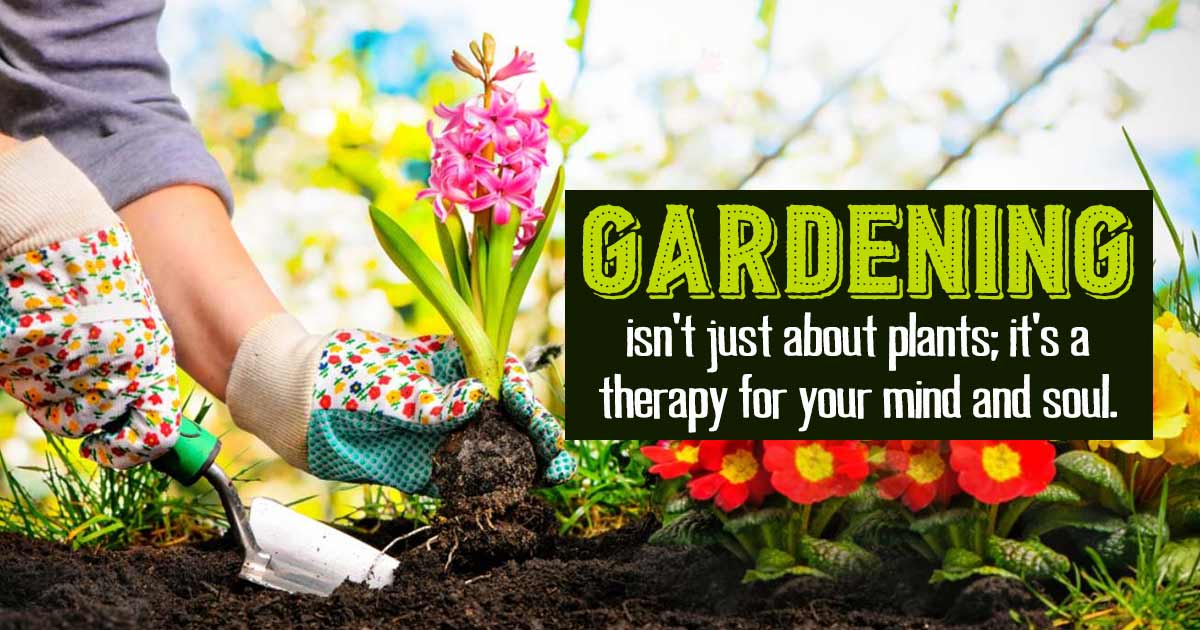Gardening, often viewed as a leisurely activity, offers far more than just the pleasures of tending to plants and watching them bloom. It has been recognized as a powerful therapeutic tool with a wide range of mental health benefits.
In an increasingly fast-paced and technology-driven world, gardening provides an opportunity to connect with nature, reduce stress, enhance emotional well-being, and promote overall mental health. This essay delves into the myriad mental health benefits of gardening, supported by scientific research and anecdotal evidence.
The Connection Between Nature And Mental Health
Humans have an innate connection to nature, and this connection plays a significant role in our mental well-being. Biophilia, a term coined by biologist E.O. Wilson, refers to the instinctual bond between humans and other living systems.
Numerous studies have shown that exposure to nature can reduce stress, anxiety, and depression, ultimately improving mental health.
Gardening is a direct and tangible way to foster this connection. When individuals engage with plants and the natural environment, they tap into the soothing and restorative qualities of nature.
In a bid to reap the mental health benefits of gardening, the practice encourages people to step away from the demands of daily life and immerse themselves in the present moment, fostering a sense of mindfulness.
Stress Reduction And Anxiety Management
One of the most prominent mental health benefits of gardening is stress reduction. The act of gardening demands attention and focus, diverting one’s thoughts from sources of stress and worry. A study published in the Journal of Health Psychology found that gardening can lead to significant reductions in cortisol levels, the hormone associated with stress.
Moreover, the physical exertion involved in gardening releases endorphins, the body’s natural mood boosters. These “feel-good” chemicals can help alleviate symptoms of anxiety and depression. Gardening, therefore, provides a holistic approach to managing stress and anxiety by addressing both the physical and psychological aspects of these conditions.
Enhanced Mood And Emotional Well-being
Gardening is often described as a source of happiness and contentment. The process of nurturing plants, watching them grow, and eventually enjoying the fruits of one’s labor can be immensely rewarding. This sense of accomplishment and connection to the natural world can significantly enhance mood and emotional well-being.
A study published in the Journal of Physiological Anthropology also highlighted the mental health benefits of gardening. Its findings claimed that gardening can lead to improvements in mood and reductions in depressive symptoms. The participants who engaged in gardening reported higher self-esteem and overall life satisfaction compared to those who did not.
Furthermore, gardening provides a creative outlet that allows individuals to express themselves through design, color choices, and plant selection. This creative aspect of gardening can serve as a form of self-expression and emotional release, helping individuals process and cope with their emotions in a healthy way.
Building Resilience And Coping Skills
Gardening teaches valuable life lessons that can contribute to better mental health. It requires patience, perseverance, and adaptability. Gardeners must learn to accept setbacks, such as plant diseases or adverse weather conditions, and find ways to overcome challenges. These experiences can help individuals build resilience and develop coping skills that are transferable to other areas of life.
Additionally, the act of nurturing and caring for plants can foster a sense of purpose and responsibility. Gardening often involves long-term commitment, and the anticipation of future rewards can provide motivation and a sense of hope, particularly for individuals struggling with mental health issues.
Social Connection And Support
Gardening can also promote social interaction and support, which are crucial aspects of mental health. Community gardens, in particular, provide spaces where people can come together, share their love for gardening, and build meaningful relationships. Socializing with others who share similar interests can reduce feelings of loneliness and isolation.
Moreover, gardening in groups or with family members can strengthen bonds and improve communication. Working collaboratively on a garden project fosters a sense of unity and accomplishment, leading to increased feelings of connectedness and support.
Mindfulness And Mind-Body Connection
Gardening encourages mindfulness, the practice of being fully present in the moment. When tending to plants, individuals must focus on the task at hand, whether it’s weeding, watering, or pruning. This mindfulness can lead to a reduction in rumination, a common cognitive pattern associated with anxiety and depression.
Furthermore, gardening can promote a mind-body connection. Engaging in physical activity in the garden, such as digging, planting, and weeding, can help individuals become more attuned to their bodies. This increased awareness of physical sensations can contribute to a greater sense of self and well-being.
The mental health benefits of gardening are many, ranging from stress reduction and anxiety management to enhanced mood and emotional well-being. This therapeutic activity taps into our innate connection to nature, fostering mindfulness, resilience, and coping skills. Additionally, gardening can promote social connection and support, further contributing to improved mental health.
As the world becomes more fast-paced and technology-driven, the simple act of nurturing plants and connecting with the natural world becomes increasingly valuable. Gardening serves as a reminder of our deep-rooted connection to the environment and offers a therapeutic sanctuary for individuals seeking solace and well-being.
It is a tangible and accessible means of enhancing mental health and should be embraced as a powerful tool in the quest for psychological well-being.




























